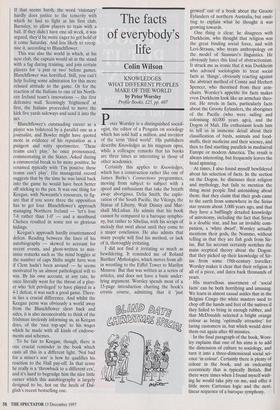The facts of everybody's life
Colin Wilson
KNOWLEDGES: WHAT DIFFERENT PEOPLES MAKE OF THE WORLD by Peter Worsley Profile Books, £25, pp. 407 Peter Worsley is a distinguished sociol- ogist, the editor of a Penguin on sociology which has sold half a million, and inventor of the term 'third world'. His publishers describe Knowledges as his magnum opus, while a colleague remarks that his books are three times as interesting as those of other academics.
Certainly this applies to Knowledges, which has a construction rather like one of James Burke's Connections programmes, moving from subject to subject with a speed and enthusiasm that take the breath away: aborigines, Delia Smith, the explo- ration of the South Pacific, the Vikings, the Statue of Liberty, Walt Disney and Mar- shall McLuhan. He admits that his book cannot be compared to a baroque sympho- ny, but rather to Sibelius, with his scraps of melody that swirl about until they come to a major conclusion. He also admits that many people will find his method, or lack of it, thoroughly irritating.
I did not find it irritating so much as bewildering. It reminded me of Roland Barthes' Mythologies, which moves from all- in wrestling to the Eiffel Tower to Marilyn Monroe. But that was written as a series of articles, and does not have a basic under- lying argument. Worsley spends most of a 15-page introduction charting the book's erratic course, admitting that it 'just growed' out of a book about the Groote Eylanders of northern Australia, but omit- ting to explain what he thought it was growing towards.
One thing is clear: he disagrees with Durkheim, who thought that religion was the great binding social force, and with Levi-Strauss, who treats anthropology on the model of Saussure's linguistics. He obviously hates this kind of abstractionism. It struck me as ironic that it was Durkheim who advised sociologists to treat social facts as 'things', obviously reacting against the abstract method of Comte and Herbert Spencer, who theorised from their arm- chairs. Worsley's appetite for facts makes even Durkheim look like an armchair theo- rist. He revels in facts, particularly facts about the Groote Eylanders, the aborigines of the Pacific (who were sailing and colonising 60,000 years ago), and the Dogon of Mali. His enthusiasm leads him to tell us in immense detail about their classification of birds, animals and food- stuffs, their medicine and their science, and then to find startling parallels in mediaeval Europe or modern America. The result is always interesting, but frequently leaves the head spinning.
At times, I also found myself bewildered about his selection of facts. In the section on the Dogon, he discusses their religion and mythology, but fails to mention the thing most people find astonishing about them: that they claim that their gods came to the earth from somewhere in the Sirius star system about 3,000 years ago, and that they have a bafflingly detailed knowledge of astronomy, including the fact that Sirius is a double star, and has an invisible com- panion, a 'white dwarf'. Worsley actually mentions their gods, the Nommo, without telling us that they are fish gods from Sir- ius. But his account certainly scotches the main sceptical theory about the Dogon: that they picked up their knowledge of Sir- ius from some 19th-century traveller; Worsley makes it clear that their religion is all of a piece, and dates back thousands of years.
His marvellous assortment of 'social facts' can be both horrifying and amusing. We learn in almost casual asides that in the Belgian Congo the white masters used to chop off the hands and feet of the natives if they failed to bring in enough rubber, and that McDonalds selected a bright orange colour as being 'optimally attractive' for luring customers in, but which would drive them out again after 40 minutes.
In the final paragraph of the book, Wors- ley explains that one of his aims is to add the dimension of culture to sociology, and turn it into a three-dimensional social sci- ence 'in colour'. Certainly there is plenty of colour in the book, and an endearing eccentricity that is typically British. But there were times when I found myself wish- ing he would take pity on me, and offer a little more Cartesian logic and the neat, linear sequence of a baroque symphony.


















































































 Previous page
Previous page